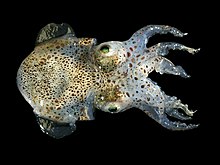Sepiolida
| Bobtail squid | |
|---|---|
 |
|
| Sepiola atlantica | |
| Scientific classification | |
| Kingdom: | Animalia |
| Phylum: | Mollusca |
| Class: | Cephalopoda |
| Superorder: | Decapodiformes |
| Order: |
Sepiolida Fioroni, 1981 |
| Families | |
Bobtail squid (order Sepiolida) are a group of cephalopods closely related to cuttlefish. Bobtail squid tend to have a rounder mantle than cuttlefish and have no cuttlebone. Despite their name, they are not true squid. They have eight suckered arms and two tentacles and are generally quite small (typical male mantle length being between 1 and 8 cm). Sepiolids live in shallow coastal waters of the Pacific Ocean and some parts of the Indian Ocean and Atlantic Ocean as well as in shallow waters on the west coast of the Cape Peninsula off South Africa. Like cuttlefish, they can swim by either using the fins on their mantle or by jet propulsion. They are also known as dumpling squid (owing to their rounded mantle) or stubby squid.
Bobtail squid have a symbiotic relationship with bioluminescent bacteria (Aliivibrio fischeri), which inhabit a special light organ in the squid's mantle. The bacteria are fed a sugar and amino acid solution by the squid and in return hide the squid's silhouette when viewed from below by matching the amount of light hitting the top of the mantle. The organ contains filters which may alter the wavelength of luminescence closer to that of downwelling moonlight and starlight; a lens with biochemical similarities to the squid's eye to diffuse the bacterial luminescence; and a reflector which directs the light ventrally.
...
Wikipedia
